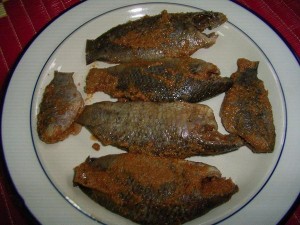Fermented fish isn’t for me. It’s not just a quality/taste thing, I also worry about the safety of the fermentation process – especially if it was carried out at home.
Deviating from the prescribed steps can create the perfect environment for Clostridium botulinum spore outgrowth, germination and toxin production. Of the 20-30 cases of botulism in the U.S. every year, the majority are linked to improper home canning. Last year, a Washington man gave himself botulism after eating elk that he canned using an old family recipe. He used a pressure cooker instead of a pressure canner and sped up the cooling time. A couple of years ago in Oregon, three folks became ill after eating under-processed beets. Botulism happens, and when it does, it’s nasty.
According to the Alaska Dispatch News, a death and two other botulism illnesses have been linked to a meal of fermented fish heads in the Yukon-Kuskokwim Delta.
Of four people who ate together last week, one died and two others fell ill, said Louisa Castrodale, an epidemiologist in the Alaska Division of Public Health.
Alaska State Troopers on Sunday evening identified the man who died as Allen Nook, 59, of Lower Kalskag, a village of about 300 people on the Kuskokwim River 350 miles west of Anchorage. He ate the fish Wednesday and complained of seeing double and feeling ill, according to the troopers report.
Nook was found dead in his home Friday. His body was flown to Anchorage for an autopsy by the state medical examiner.
